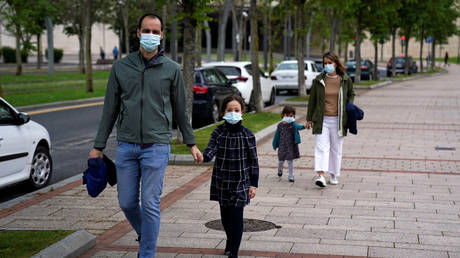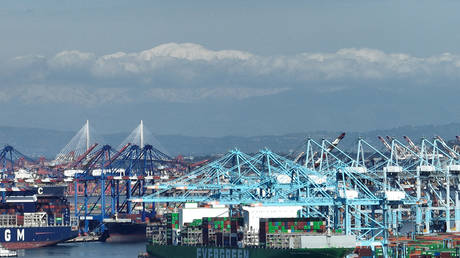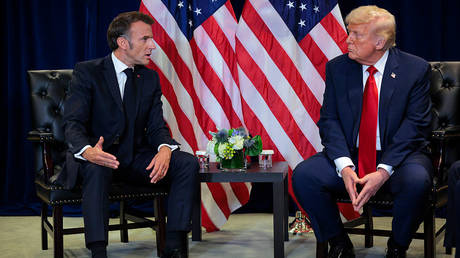
The Western media has been flooded with stories about a “mysterious disease” affecting children in the UK and the US that is supposedly linked to Covid-19. RT has asked a number of pediatricians if there is cause for concern.
On Monday, the UK’s Paediatric Intensive Care Society (PICS) sent a memo to British doctors warning them about a rise in cases of a “multi-system inflammatory state requiring intensive care” that had been exhibited in “children of all ages” in several regions across the UK, including London. It further noted that the symptoms of the condition were “consistent with severe Covid-19,” and were observed particularly in those youngsters who had previously tested positive for the novel coronavirus.
The news was quickly picked up by the media across the UK, as well as in the US, which started reporting on such cases both in Great Britain and across the pond. It was reported that doctors in Australia, too, are “on alert,” following the worrying developments. Journalists rushed to inextricably link the new disease to the novel coronavirus pandemic, which has thus far infected more than 3.2 million people and claimed over 215,000 lives across the world.
In some reports, the syndrome was hastily branded Kawasaki disease, provoking a surge of interest in the nature of this rare immune-system disorder, which usually affects children younger than five years old, causing severe fever and virus-like symptoms. In fact, the initial PICS memo said only that the syndrome has “overlapping features” with atypical Kawasaki disease.
The media universally reported the “rising number” of children being affected by the mysterious syndrome, although precise data on how many was noticeably omitted.
So, should we be worried about the potential of a widespread outbreak of this mystery illness, which might have an impact on youngsters around the world? And is there really any connection between that illness and Covid-19?
Panic would be ‘really a mess’
Contrary to how it might seem from some alarming news pieces, the world is highly unlikely to be on the brink of another epidemic, pediatricians believe. Kawasaki disease – if that is indeed what it is or has features of – has so far never been known to rapidly propagate through a population.
“I wouldn’t expect an outbreak of Kawasaki in children, because Kawasaki itself is rare,” Angelo Ravelli, a professor of pediatrics and the director of the Pediatric Residency Program at the University of Genoa, said. “Also, in spite of this increase in the numbers in [recent]weeks, we’re not talking [even]of dozens, [let alone]hundreds of cases.”
Ravelli, who is also the head of rheumatology at the Giannina Gaslini Institute, one of Italy’s largest pediatric hospitals, offered further reassurance, saying that, per year, the medics there see only between seven and nine patients with Kawasaki disease, on average.
In fact, the sudden rise in multi-system inflammations in children might not necessarily even be linked to one particular cause at all, the pediatricians believe.
“We don’t know yet whether the instances we’re seeing these days are real Kawasaki disease [cases]or [cases of]Kawasaki-like disease, which means vasculitis. Indeed, many of these children were found to have non-typical symptoms of Kawasaki disease,” Ravelli warns. Anne Rowley, a professor of pediatrics, microbiology and immunology at Northwestern University’s Feinberg School of Medicine, in the US, says the recent cases could be triggered by a number of factors.
“It’s not clear whether the cases are caused by the same process, or whether some are caused by Covid-19 and some by another condition, such as toxic shock syndrome, which is [the result of]a bacterial infection,” she told RT.
Kawasaki disease is quite treatable and would not cause serious harm, if detected in time, the doctors said. Its most dangerous complication, a coronary-artery aneurism, can be avoided as long as the child’s condition is properly managed, the pediatricians say.
“Most children escape heart sequelae [after-effects] if they are treated with intravenous gammaglobulin in the first 10 days of fever,” Rowley explained. And Ravelli reported that Italy has not seen “any fatal cases of Kawasaki disease” so far at all.
Undue panic among parents could become a much heavier burden for the medics than treatment of cases of the disease itself. “We don’t need to generate panic among families, otherwise it would really be a mess,” the Italian professor warned.
So, is Covid-19 involved?
As for the link between the Kawasaki-like symptoms in children and the novel coronavirus, medics are not yet entirely sure whether it exists.
Kawasaki disease has been known for decades – long before Covid-19. Yet, the scientists still do not know its root causes. Over the years, theories have been circulating that linked the disease to some sort of viral or bacterial infection that could serve as a trigger for it. No particular virus or bacteria has been “consistently found in association with the syndrome,” as Ravelli put it.
However, if a “significant” number of the recent cases is reasonably linked to coronavirus, it might well be recognized as one of the infections that “may be responsible for Kawasaki disease or, at least, some forms of Kawasaki disease, or part of cases of it,” the Italian professor believes.
Rowley is more skeptical. “Covid-19 is caused by an entirely new virus, and Kawasaki disease has been well recognized for 50 years, [so]it is highly unlikely that Covid-19 is a significant cause of most cases,” she said, adding that it could be being triggered instead by some still-unidentified virus that has been circulating in the human population for decades.
It seems too early to say whether this inflammatory syndrome has anything to do with Covid-19 or to predict with any certainty what we are facing. However, it would appear unlikely that the instances thus far of Kawasaki-like disease in children are the precursor to an epidemic.
Think your friends would be interested? Share this story!




